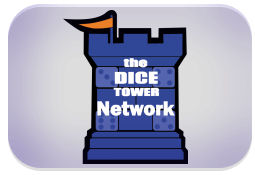Quick Board Game Reviews That Pack a Punch. No Rules, Just Opinions.
From the Publisher:
Once Yokohama was just a fishing village, but now at the beginning of the Meiji era it’s becoming a harbor open to foreign countries and one of the leading trade cities of Japan. As a result, many Japanese products such as copper and raw silk are collected in Yokohama for export to other countries. At the same time, the city is starting to incorporate foreign technology and culture, with even the streets becoming more modernized. In the shadow of this development was the presence of many Yokohama merchants.
In YOKOHAMA, each player is a merchant in the Meiji period, trying to gain fame from a successful business, and to do so they need to build a store, broaden their sales channels, learn a variety of techniques, and (of course) respond to trade orders from abroad.

 Yokohama is all about efficiency of movement, building, and gathering of resources so you can turn it into victory points or even extra actions. There’s a dance that happens across the board as you lay down paths for your president to traverse. Since each president, assistant, or building at a location is an additional power, where you expend these limited resources can hinder or help your climb up the Victory Point tracker. There’s a fluidity of movement and creative thinking akin to hockey, and that makes gameplay extremely entertaining. Yokohama is all about efficiency of movement, building, and gathering of resources so you can turn it into victory points or even extra actions. There’s a dance that happens across the board as you lay down paths for your president to traverse. Since each president, assistant, or building at a location is an additional power, where you expend these limited resources can hinder or help your climb up the Victory Point tracker. There’s a fluidity of movement and creative thinking akin to hockey, and that makes gameplay extremely entertaining. |
 Each turn, you’ll spread your gentlemen around the city, not just to reap the benefits of additional labor, but to pave a path for your president to arrive and whip them into action. You’ll collect the fruits of their labors to fulfill contracts, earn achievements, and buy technologies to turn your operations into a lean, mean business machine. Earn enough sway with your foreign trading partners, and they’ll send you an agent to boost your productivity. Yokohama, however, is still a small city, so you’ll be vying for position in tight spaces with other players. Each turn, you’ll spread your gentlemen around the city, not just to reap the benefits of additional labor, but to pave a path for your president to arrive and whip them into action. You’ll collect the fruits of their labors to fulfill contracts, earn achievements, and buy technologies to turn your operations into a lean, mean business machine. Earn enough sway with your foreign trading partners, and they’ll send you an agent to boost your productivity. Yokohama, however, is still a small city, so you’ll be vying for position in tight spaces with other players. |

 This game feels like an amalgamation rather abstracted mechanics to me. The set collection exists, but it is interspersed between contracts and technologies. The area of control is part of the Customs Board, Church Board, and Technology Cards. There is an ability to gain incremental improvements on each board by adding Shops and Trading houses to boards that you want to utilize more often which in turn require fewer assistants to gain the maximum effect. In reality there are so many different ways to get what you need, that while there are workers you place, it really is a worker movement game. The real struggle and by that I mean fun is to navigate the myriad of options available. It can be incredibly difficult to stay on target. This game feels like an amalgamation rather abstracted mechanics to me. The set collection exists, but it is interspersed between contracts and technologies. The area of control is part of the Customs Board, Church Board, and Technology Cards. There is an ability to gain incremental improvements on each board by adding Shops and Trading houses to boards that you want to utilize more often which in turn require fewer assistants to gain the maximum effect. In reality there are so many different ways to get what you need, that while there are workers you place, it really is a worker movement game. The real struggle and by that I mean fun is to navigate the myriad of options available. It can be incredibly difficult to stay on target. |
 Take a little bit of area control, a dash of set collection, a smidgen of resource gathering, and a soupcon of area majority, blend together well, and you wind up with the heady concoction that is Yokohama. It’s a hodgepodge of modern mechanics that somehow manages to play nice together. That everything feels connected is a testament to Hiyashi Hisashi’s thoughtful design. Of course, it helps if you focus on a few select goals and stick to it. Collecting goods will help you earn points by fulfilling contracts; focusing on imports will give you fewer opportunities to score, but those can yield even more points. Investing in tech will not only make your actions more productive but can also net you some end-game bonus. Take a little bit of area control, a dash of set collection, a smidgen of resource gathering, and a soupcon of area majority, blend together well, and you wind up with the heady concoction that is Yokohama. It’s a hodgepodge of modern mechanics that somehow manages to play nice together. That everything feels connected is a testament to Hiyashi Hisashi’s thoughtful design. Of course, it helps if you focus on a few select goals and stick to it. Collecting goods will help you earn points by fulfilling contracts; focusing on imports will give you fewer opportunities to score, but those can yield even more points. Investing in tech will not only make your actions more productive but can also net you some end-game bonus.
|

 The designer, Hiyashi Hisashi, is Japanese, so a theme about industrialization of Meiji Era Japan seems like a natural draw. I can see how the theme plays out on the board, but rarely do I find the narrative in the game. It almost completely grabs me as an exercise in efficiency, which on second thought seems like a very Japanese way to run a business. So maybe racing around the board in an effort to be the biggest zaibatsu on the board without wasting resources and actions is fairly thematic after all. The designer, Hiyashi Hisashi, is Japanese, so a theme about industrialization of Meiji Era Japan seems like a natural draw. I can see how the theme plays out on the board, but rarely do I find the narrative in the game. It almost completely grabs me as an exercise in efficiency, which on second thought seems like a very Japanese way to run a business. So maybe racing around the board in an effort to be the biggest zaibatsu on the board without wasting resources and actions is fairly thematic after all. |
 There aren’t many opportunities here to create a narrative with your actions, and Yokohama probably won’t have you recounting tales of epic games with your friends. It’s an efficiency exercise, where you attempt to chain A, B, and C in order to get points with D. The Meiji-era Japan setting is interesting, but like a lot of games I’m not sure it’s essential. Perhaps the most thematic bit of gameplay is the foreign agent, who arrives to help you whenever you do business with their country twice. There aren’t many opportunities here to create a narrative with your actions, and Yokohama probably won’t have you recounting tales of epic games with your friends. It’s an efficiency exercise, where you attempt to chain A, B, and C in order to get points with D. The Meiji-era Japan setting is interesting, but like a lot of games I’m not sure it’s essential. Perhaps the most thematic bit of gameplay is the foreign agent, who arrives to help you whenever you do business with their country twice.
|

 When TMG brought Yokohama over to North America, they left most of it the same. They had Adam McIver clean up the iconography and make the boards a little less busy which helped. As someone who has to wear bifocals, this game is a challenge. The colors wash together, and the card art isn’t distinctive at a distance. All that being said, it has a lovely table presence, and it is sure to grab a lot of attention. When TMG brought Yokohama over to North America, they left most of it the same. They had Adam McIver clean up the iconography and make the boards a little less busy which helped. As someone who has to wear bifocals, this game is a challenge. The colors wash together, and the card art isn’t distinctive at a distance. All that being said, it has a lovely table presence, and it is sure to grab a lot of attention.
|
 The art on TMG’s edition is a definite improvement from the Japanese publication, but still suffers from a soft pastel palette that can make some areas a little hard to distinguish from others. In a four player game, using all the locations, the board sometimes looks at first like a dreamy blur and can take some turns to get your bearings. Some of the iconography can be a little confusing as well, especially on the foreign agents, each of which has both a flag and Kanji crammed into a tiny circular space. The art on TMG’s edition is a definite improvement from the Japanese publication, but still suffers from a soft pastel palette that can make some areas a little hard to distinguish from others. In a four player game, using all the locations, the board sometimes looks at first like a dreamy blur and can take some turns to get your bearings. Some of the iconography can be a little confusing as well, especially on the foreign agents, each of which has both a flag and Kanji crammed into a tiny circular space. |

 So let's start with the negatives. Setup is pretty involved. It’s hard to read the boards and cards, and maybe the best way to play is standing, so you can access the sprawl much easier. The rules are also a bit convoluted, for the weight. I’d rather have the Deluxe version than the retail which will jack up the price, but at a $60 MSRP for the Retail version, you are getting a lot of value. The pluses are that Yokohama is a very dynamic game with lots of replayability. It looks amazing and can play quickly with enough experience. On top of that, there are true multiple paths of victory. I think there is plenty of game in this box, and how well it all works together increases my esteem for Hiyashi Hisashi as a designer. So let's start with the negatives. Setup is pretty involved. It’s hard to read the boards and cards, and maybe the best way to play is standing, so you can access the sprawl much easier. The rules are also a bit convoluted, for the weight. I’d rather have the Deluxe version than the retail which will jack up the price, but at a $60 MSRP for the Retail version, you are getting a lot of value. The pluses are that Yokohama is a very dynamic game with lots of replayability. It looks amazing and can play quickly with enough experience. On top of that, there are true multiple paths of victory. I think there is plenty of game in this box, and how well it all works together increases my esteem for Hiyashi Hisashi as a designer. |
 You probably won’t be surprised by Yokohama after your first session. There’s quite a bit of variability here, what with the contracts, the random map generation, the different bonuses placed on locations, and the various achievements up for grabs … but it doesn’t make the game dramatically different from play to play. Overall, It’s a very nice production by TMG. The “deluxified” version has wooden bits for the goods and buildings, which helps them really stand out in a game that can be hard to read at a glance. Also, be advised that the rule book isn’t the greatest, perhaps due to a poor translation. You probably won’t be surprised by Yokohama after your first session. There’s quite a bit of variability here, what with the contracts, the random map generation, the different bonuses placed on locations, and the various achievements up for grabs … but it doesn’t make the game dramatically different from play to play. Overall, It’s a very nice production by TMG. The “deluxified” version has wooden bits for the goods and buildings, which helps them really stand out in a game that can be hard to read at a glance. Also, be advised that the rule book isn’t the greatest, perhaps due to a poor translation.
|

 So if you listen to the podcast we generally poo on double scores, but that’s what I am going to do. I think this is a great game that I am happy to own. The gameplay is engaging, and the overall positives outweigh the negatives. I am going to give a high 4 to the Retail version. For the Deluxe edition though, I think TMG deserves some recognition for what an outstanding job they did, and since that’s the copy that I own, I am giving Yokohama a bump to a low 5. So if you listen to the podcast we generally poo on double scores, but that’s what I am going to do. I think this is a great game that I am happy to own. The gameplay is engaging, and the overall positives outweigh the negatives. I am going to give a high 4 to the Retail version. For the Deluxe edition though, I think TMG deserves some recognition for what an outstanding job they did, and since that’s the copy that I own, I am giving Yokohama a bump to a low 5.
|
 Yokohama is a bit of an odd duck. It’s not a heavy game, but it looks like one, and its combination of mechanics makes it tough to summarize succinctly. At its core, it’s ultimately about efficiency, which I find appealing in games, but I sometimes struggle with it in identifying locations and reading technology cards. I really like Yokohama, and I’m glad I have the “deluxified” edition in my collection, but I can’t say that it sets my world on fire, which makes it a solid 4 on the Dukes scale. Yokohama is a bit of an odd duck. It’s not a heavy game, but it looks like one, and its combination of mechanics makes it tough to summarize succinctly. At its core, it’s ultimately about efficiency, which I find appealing in games, but I sometimes struggle with it in identifying locations and reading technology cards. I really like Yokohama, and I’m glad I have the “deluxified” edition in my collection, but I can’t say that it sets my world on fire, which makes it a solid 4 on the Dukes scale. |
| The Dukes of Dice Rating System |
|---|
| 1 = Poorly designed but playable. Not necessarily fun. |
| 2 = Game has some merit but has significant detractions. |
| 3 = Game is okay, not exciting. Will play in the right situation. |
| 4 = A good game. Worth playing, just not all the time. Belongs in the Duchy. |
| 5 = A great game, will rarely turn down a play of it. |
| 6 = An all-time favorite that is a contender for the top 10 |
If you want to connect with us you can find:
Matthew on Twitter as @uncouthtooth or matthew@dukesofdice.com
Matt on Twitter as @matosowalker
Join the discussion in our Board Game Geek Guild on this review HERE









